19.倒装句文字
中文倒装句举例子

中文倒装句举例子
1. “饭都吃了没,你?” 就像我们平时会问“你吃了饭没?”,这样
一颠倒,是不是感觉很不一样呀?
2. “去哪儿呀,你这是要?” 这就好像是在好奇地问“你要去哪儿呀?”,但语序一变,更有味道了呢!
3. “怎么样了呀,那件事?”哎呀,是不是比“那件事怎么样了呀”更能引起人的兴趣!
4. “走啦,咱们!” 多干脆利落呀,比“咱们走啦”更有那种说走就走的
劲儿!
5. “睡吧,孩子!”就像是温柔地哄着孩子睡觉,和“孩子睡吧”感觉不同呢。
6. “累坏了吧,你肯定!”这不是比“你肯定累坏了”更能表达出那种关切嘛。
7. “开心不,今天?”这和“今天开心不”比起来,更有一种面对面询问的亲近感呀。
8. “行了吧,这样?”好像在问“这样行了吧”,但又多了点质疑的感觉呢。
9. “知道了不,这事儿?”和“这事儿知道了不”一样的意思,但就是感觉更特别呢!
我的观点结论就是中文倒装句很有趣呀,能让表达更加多样和鲜活,大家平时可以多尝试用用呀!。
倒装句的结构和用法
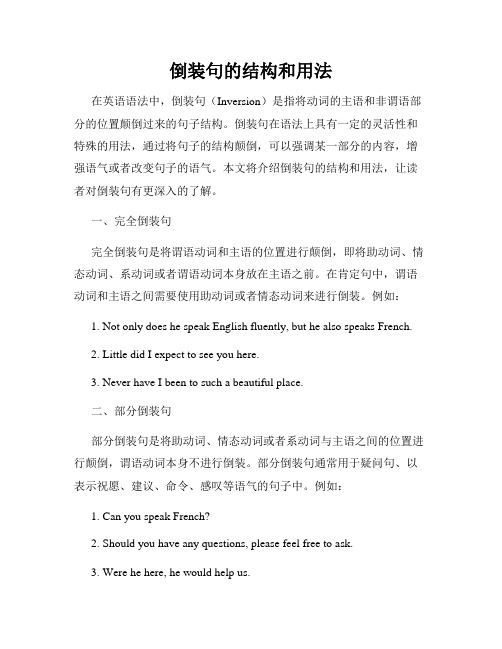
倒装句的结构和用法在英语语法中,倒装句(Inversion)是指将动词的主语和非谓语部分的位置颠倒过来的句子结构。
倒装句在语法上具有一定的灵活性和特殊的用法,通过将句子的结构颠倒,可以强调某一部分的内容,增强语气或者改变句子的语气。
本文将介绍倒装句的结构和用法,让读者对倒装句有更深入的了解。
一、完全倒装句完全倒装句是将谓语动词和主语的位置进行颠倒,即将助动词、情态动词、系动词或者谓语动词本身放在主语之前。
在肯定句中,谓语动词和主语之间需要使用助动词或者情态动词来进行倒装。
例如:1. Not only does he speak English fluently, but he also speaks French.2. Little did I expect to see you here.3. Never have I been to such a beautiful place.二、部分倒装句部分倒装句是将助动词、情态动词或者系动词与主语之间的位置进行颠倒,谓语动词本身不进行倒装。
部分倒装句通常用于疑问句、以表示祝愿、建议、命令、感叹等语气的句子中。
例如:1. Can you speak French?2. Should you have any questions, please feel free to ask.3. Were he here, he would help us.三、介词短语倒装句当句子以表示地点、时间、方式等介词短语开头时,为了突出位置、时间、方式等成分,常常将介词短语和其后面的动词原形或助动词进行倒装。
例如:1. In front of the house stands a tall tree.2. At the top of the mountain lies a beautiful lake.3. By learning from each other can we improve our skills.四、祈使句倒装句祈使句通常用于表示命令、请求、建议等语气的句子中。
文言文倒装句例子
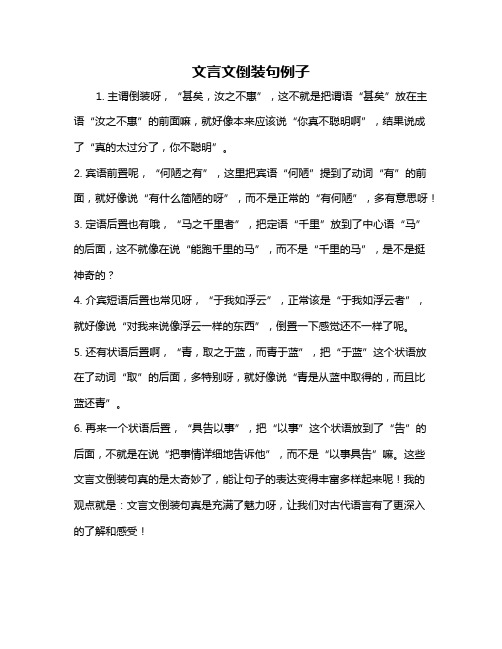
文言文倒装句例子
1. 主谓倒装呀,“甚矣,汝之不惠”,这不就是把谓语“甚矣”放在主语“汝之不惠”的前面嘛,就好像本来应该说“你真不聪明啊”,结果说成了“真的太过分了,你不聪明”。
2. 宾语前置呢,“何陋之有”,这里把宾语“何陋”提到了动词“有”的前面,就好像说“有什么简陋的呀”,而不是正常的“有何陋”,多有意思呀!
3. 定语后置也有哦,“马之千里者”,把定语“千里”放到了中心语“马”的后面,这不就像在说“能跑千里的马”,而不是“千里的马”,是不是挺神奇的?
4. 介宾短语后置也常见呀,“于我如浮云”,正常该是“于我如浮云者”,就好像说“对我来说像浮云一样的东西”,倒置一下感觉还不一样了呢。
5. 还有状语后置啊,“青,取之于蓝,而青于蓝”,把“于蓝”这个状语放在了动词“取”的后面,多特别呀,就好像说“青是从蓝中取得的,而且比蓝还青”。
6. 再来一个状语后置,“具告以事”,把“以事”这个状语放到了“告”的后面,不就是在说“把事情详细地告诉他”,而不是“以事具告”嘛。
这些文言文倒装句真的是太奇妙了,能让句子的表达变得丰富多样起来呢!我的观点就是:文言文倒装句真是充满了魅力呀,让我们对古代语言有了更深入的了解和感受!。
倒装句用法总结范文

倒装句用法总结范文
倒装句是一种常见的语法结构,在句子中将主语和谓语动词的位置调换。
倒装句的主要用途是用来强调句子中的其中一成分,或者用于特殊的
语法结构。
下面是倒装句的常见用法总结:
1.全倒装句:将助动词、情态动词或感叹词放在主语之前,谓语动词
跟在主语后面。
例如:“Never have I seen such a beautiful sunset.”(我从来没有见过如此美丽的日落。
)
2.部分倒装句:将助词、情态动词或谓语动词前置,谓语动词和主语
顺序不变。
例如:“Only by studying hard can you pass the exam.”(只有通过努力学习你才能通过考试。
)
3.状语倒装句:将状语前置,形成倒装结构。
例如:“On the top
of the hill stood a large tree.”(山顶上有一棵大树。
4.疑问句倒装:在疑问句中将助词、情态动词或谓语动词与主语互换
位置。
例如:“Are you going to the party?”(你要去聚会吗?)需要注意的是,在倒装句中,如果有两个动词,只将助词或情态动词
提前,而谓语动词保持不变的位置。
例如:“I should have gone.”
(我本应该去的。
倒装句语法

倒装句语法一、倒装句的定义倒装句是一种语法结构,将句子中的谓语动词、助动词或情态动词等提到主语之前,这种语序与正常的主语在前、谓语在后的语序不同。
二、倒装句的类型1. 完全倒装- 定义- 当句子中的谓语动词全部置于主语之前时,称为完全倒装。
- 常见情况- 表示方位、地点的副词或介词短语位于句首时,如:- There goes the bell.(铃响了。
)- Here comes the bus.(公共汽车来了。
)- In front of the house stands a big tree.(房子前面有一棵大树。
)- 表语位于句首时,为了保持句子平衡或强调表语,如:- Present at the meeting were some famous scientists.(出席会议的是一些著名的科学家。
)2. 部分倒装- 定义- 当句子中的助动词、情态动词或be动词提到主语之前,而谓语的主要部分仍在主语之后时,称为部分倒装。
- 常见情况- 否定词或半否定词位于句首时,如:- Never have I seen such a beautiful place.(我从未见过如此美丽的地方。
)- Hardly had he arrived when it began to rain.(他刚到就开始下雨了。
)- only +状语(副词、介词短语、从句)位于句首时,如:- Only in this way can you solve the problem.(只有这样你才能解决这个问题。
)- Only when he returned did we find out the truth.(只有当他回来时我们才发现真相。
)- so/neither/nor位于句首,表示前面所说的情况也适用于另一人或物时,如:- He likes reading, so do I.(他喜欢阅读,我也喜欢。
)- He didn't go to the party, neither did I.(他没去参加聚会,我也没去。
倒装句语文
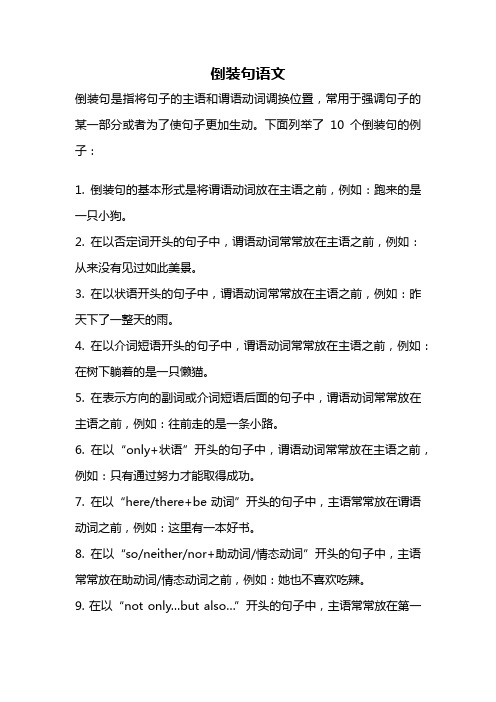
倒装句语文
倒装句是指将句子的主语和谓语动词调换位置,常用于强调句子的某一部分或者为了使句子更加生动。
下面列举了10个倒装句的例子:
1. 倒装句的基本形式是将谓语动词放在主语之前,例如:跑来的是一只小狗。
2. 在以否定词开头的句子中,谓语动词常常放在主语之前,例如:从来没有见过如此美景。
3. 在以状语开头的句子中,谓语动词常常放在主语之前,例如:昨天下了一整天的雨。
4. 在以介词短语开头的句子中,谓语动词常常放在主语之前,例如:在树下躺着的是一只懒猫。
5. 在表示方向的副词或介词短语后面的句子中,谓语动词常常放在主语之前,例如:往前走的是一条小路。
6. 在以“only+状语”开头的句子中,谓语动词常常放在主语之前,例如:只有通过努力才能取得成功。
7. 在以“here/there+be动词”开头的句子中,主语常常放在谓语动词之前,例如:这里有一本好书。
8. 在以“so/neither/nor+助动词/情态动词”开头的句子中,主语常常放在助动词/情态动词之前,例如:她也不喜欢吃辣。
9. 在以“not only…but also…”开头的句子中,主语常常放在第一
个动词之后,例如:他不仅会唱歌,还会跳舞。
10. 在以“hardly/scarcely…when…”开头的句子中,主语常常放在第一个动词之后,例如:刚出门,就下起了大雨。
以上是10个倒装句的例子,通过倒装句的运用,可以使句子更加生动有力,增强表达的效果。
倒装句是语文学习中的重要知识点,希望大家能够熟练掌握并灵活运用。
英语倒装句12种类型及例句
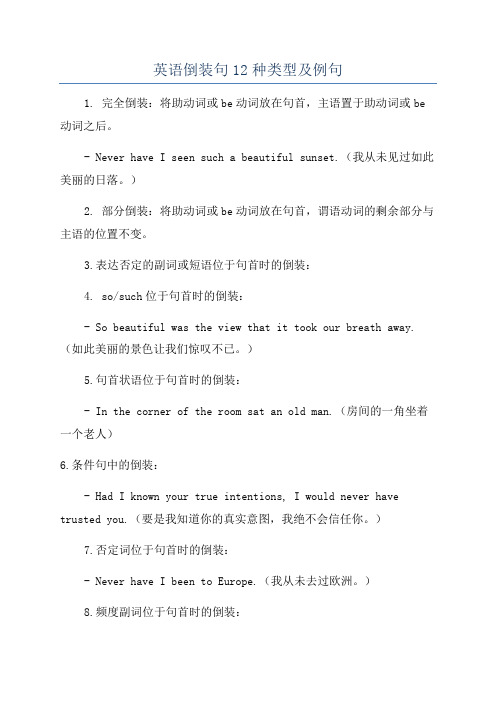
英语倒装句12种类型及例句1. 完全倒装:将助动词或be动词放在句首,主语置于助动词或be 动词之后。
- Never have I seen such a beautiful sunset.(我从未见过如此美丽的日落。
)2. 部分倒装:将助动词或be动词放在句首,谓语动词的剩余部分与主语的位置不变。
3.表达否定的副词或短语位于句首时的倒装:4. so/such位于句首时的倒装:- So beautiful was the view that it took our breath away.(如此美丽的景色让我们惊叹不已。
)5.句首状语位于句首时的倒装:- In the corner of the room sat an old man.(房间的一角坐着一个老人)6.条件句中的倒装:- Had I known your true intentions, I would never have trusted you.(要是我知道你的真实意图,我绝不会信任你。
)7.否定词位于句首时的倒装:- Never have I been to Europe.(我从未去过欧洲。
)8.频度副词位于句首时的倒装:- Rarely do we see such dedication.(我们很少见到如此的奉献精神。
)9.祈使句或祈使句部分的倒装:- Stand up!(站起来!)- Be quiet, please.(请安静。
)10. only位于句首时的倒装:- Only by working hard can you achieve your goals.(只有通过努力工作,你才能实现目标。
)11.地点状语置于句首时的倒装:- In the garden were beautiful flowers.(花园里有美丽的花朵。
)12.宾语置于句首时的倒装:- A love like this I have never felt before.(我之前从未感受过如此的爱。
十句简单的倒装句语文
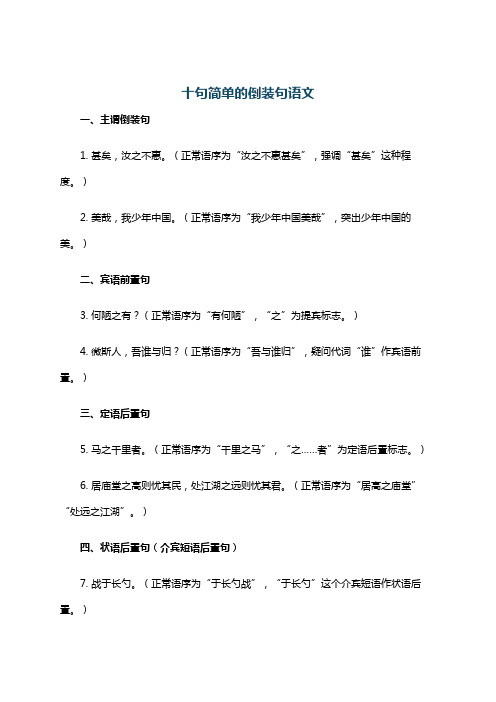
十句简单的倒装句语文
一、主谓倒装句
1. 甚矣,汝之不惠。
(正常语序为“汝之不惠甚矣”,强调“甚矣”这种程度。
)
2. 美哉,我少年中国。
(正常语序为“我少年中国美哉”,突出少年中国的美。
)
二、宾语前置句
3. 何陋之有?(正常语序为“有何陋”,“之”为提宾标志。
)
4. 微斯人,吾谁与归?(正常语序为“吾与谁归”,疑问代词“谁”作宾语前置。
)
三、定语后置句
5. 马之千里者。
(正常语序为“千里之马”,“之……者”为定语后置标志。
)
6. 居庙堂之高则忧其民,处江湖之远则忧其君。
(正常语序为“居高之庙堂”“处远之江湖”。
)
四、状语后置句(介宾短语后置句)
7. 战于长勺。
(正常语序为“于长勺战”,“于长勺”这个介宾短语作状语后置。
)
8. 受地于先王。
(正常语序为“于先王受地”。
)
9. 刻唐贤今人诗赋于其上。
(正常语序为“于其上刻唐贤今人诗赋”。
)
10. 相与步于中庭。
(正常语序为“相与于中庭步”。
)。
- 1、下载文档前请自行甄别文档内容的完整性,平台不提供额外的编辑、内容补充、找答案等附加服务。
- 2、"仅部分预览"的文档,不可在线预览部分如存在完整性等问题,可反馈申请退款(可完整预览的文档不适用该条件!)。
- 3、如文档侵犯您的权益,请联系客服反馈,我们会尽快为您处理(人工客服工作时间:9:00-18:30)。
倒装句倒装语序分为全部倒装和部分倒装,①所谓全部倒装是指将句子中的谓语动词全部置于主语之前,此时句子中没有助动词,系动词be或者情态动词。
②部分倒装指将谓语的一部分如助动词,系动词be或者情态动词倒装至主语之前。
如果句中的谓语没有助动词,系动词be或者情态动词,则需要添加助动词do,does,或者did,并将其置于主语之前。
倒装的情况不是很多,不过其中大部分都是部分倒装,全部倒装的情况很少,下面我们来看看哪些情况下要全部倒装吧。
Look!______.A.Here your teacher comesB. Comes here your teacherC.Your teacher come hereD.Here comes your teacherD.当here, there ,down ,up, away等副词或一些地点状语置于句首,而句子的主语是名词时,句子要用全部倒装。
也就是说在这道题里here在句首,然后就是谓语和主语,Here comes your teacher.当句子的地点状语提前的时候,句子也要全部倒装。
比如:在我们的教室前有一棵大树,如果地点状语在前,怎么说?In front of our classroom stands a tall tree.不过要注意,如果主语不是名词而是人称代词则不用倒装。
比如:Away they went他们离开了。
有这些地点副词,地点状语在句首,还要主语是名词,句子才要全部倒装。
另外副词then虽然不是表示地点的词,但是它在句首时也属于这种全部倒装的情况,比如:then came the our we had been looking forward to .然后我们期盼已久的时刻终于来到了。
我们来看一看另外一种全部倒装的情况__the days when teachers were looked down upon .A. Gone areB. Are goneC. Be goneD. Be gone areA表语在句首,形成全部倒装。
The days when teachers were looked down upon are gone .这句话里are gone 是系表结构,当我们把gone这个表语提前之后,句子的主语和谓语就要全部倒装了。
In each room are ten students.每个房间都有10个学生。
全部倒装除了地点状语和表语在句首之外,还有别的情况么,其它就是要部分倒装的情况了,比如:Seldom ______ any mistakes during my past few years of working here .A. would I makeB. did I makeC. I did makeD. shall I makeB句首带有否定含义的词如:no ,not never ,seldom ,little ,hardly ,at no time ,in no way 等,句子要部分倒装。
部分倒装就是助动词,系动词be或者情态动词提到主语之前。
对了,假如你昨天看了一个演出,非常精彩,于是你感概到“我从来没有看过这么好的演出”用倒装句怎么说?Never have I seen such a performance.我们所说的否定词也包括scarcely ,no sooner .这样的词,Scarcely…..when …..和No sooner…than…..表示“一…….就…….”的句型,他们连接的是时间状语从句,并且只是句子的前半部分倒装,也就是跟在scarcely和no sooner后面的部分,例如:No sooner had she gone out than a student came to visit her .她刚出门,就有一人学生来拜访她。
Not only was she working hard, __________.A. how beautiful she wasB. was she helpfulC.but also she was politeD.what a beautiful girlC当not only …..but also结构在句首时,not only后面的部分倒装,而but. also后面的部分不倒装。
他不仅拒绝了礼物,还批评了送礼的人。
Not only did refuse the gift, but also he criticized the sender.说到not only,我又想起另外一个免于,是我们在强调句中讲到的,not only还记得not only倒装时有什么特殊吗?即主句倒装,从句不倒装。
Not until the child fell asleep did the mother leave the roo. went we这位母亲直到她的孩子睡着了才离开了房间。
Often________to the lake at that time .A.did we goB. we did goC. we wentD. went weA频度副词often或always置于句首时,句子要部分倒装。
既然是部分倒装,就把助动词did提前就可以了,A再说一个always并且倒装的句子吧。
Always should we remember our teachers.我们要永远记住我们的老师听了好感动啊,希望你不仅要记住老师,更重要的是记住老师给你教的东西啊,Only five of them_______ in the office.A. I sawB. saw IC. did I seeD. that I sawC副词only位于句首的句子,通常需要部分倒装。
不过only后面经常是状语,比如我经常要你用心,因为“只有这样”你才能学好英语,这句话用英语怎么说呢?Only in this way can you learn English well.好了,我们来总结一下,哪些词在句首的时候句子要倒装。
地点状语和表语在句首,句子完全倒装,否定副词以及often,always ,only,not only在句首时,句子部分倒装。
要学的不止这些,我们继续努力吧,来看下一道题。
Mary doesn’t speak French,and neither ________.A. does JoanB. John doesC. spoke JoanD.John spokeAso,neither,nor出的短句,可以说明上文提到的肯定或否定情况也适用于其他人或物,这样的句子要部分倒装,且省略谓语中的主要动词。
我记得neither后面要省略动词,并且用助动词代替。
是不是也要倒装呀?对,Tom can speak French,So can Jack.汤姆能说法语,杰克也能。
If you won’t go ,neither will I.如果你不想去,我也不去了Tom asked me to go to play football and so I did 汤姆让我去踢足球,我就去了。
这就是我要提醒你注意的另一种情况啊,当so引出的句子用以对上文内容加以证实或肯定时,不能用倒装结构。
此时句子的意思是“的确如此”那我们就看另外一种部分倒装的情况吧。
So ________ that no people can swim in it .A. the lake is shallowB. shallow the lake isC. shallow is the lakeD. is the lake shallowC结果状语从句so….that…..句型中的so位于句首时,主句要用部分倒装。
so是用来修饰形容词的,当然是要和形容词放在一起,C啊,So frightened was he that he dared not move an inch.他被吓得一步都不敢动了。
Were I you ,I would try it again.我要是你,我就再试一次在虚拟语气的条件句中,如果从句谓语动词有were, had ,should等词,可将if省略,把were,had,或者should移到主语之前,形成部分倒装。
If it should rain tomorrow ,I shall stay at home.Should it rain tomorrow ,I shall stay at home.如果明天下雨,我将留存家里。
下面讲的可不像前面那么容易,你得听得更认真才行。
____,the president has not been able to get his own way on everything he wants to do . A. As he is popular B. Popular as he is C. As popular is he D.Popular as is heB在as引导的让步状语从句中,主谓不倒装,不过要把相关的形容词,副词,名词或动词提前至句首,然后是as,后面是主语和谓语。
在这道题里“形容词+as+主谓”结构B对。
可是当名词在句首时,你就要注意,如果需要冠词,在这种情况下,冠词是要省略的。
Although she is a girl ,she wouldn’t do less work than those boys.Girl as she is, she wouldn’t do less work than those boys.尽管她是个女孩,她也不愿比男孩子们干活干得少。
我想知道动词在as前的时候,是什么样的?如果把动词提前,就要在主语后面留一个相应的助动词。
比如:Although he tried,he couldn’t solve that problem.要是倒装了,就应该是:Try as he did ,he couldn’t solve that problem.我们又学了让步状语从句,虚拟条件句,so….that….引导的结果状语从句等一些句式中倒装的用法。
要知道在哪些情况下用完全倒装,哪些情况下要用部分倒装,再做点练习就完全没有问题了。
专项训练:1.Not only__________all their money, but ________ close to losing their lives.A. did they lose ,did they comeB. they lost ,also comeC.they lost ,they cameD.did they lose,they came2________ received law degrees as today.A. Never so many women haveB. The women aren’t everC.Never have so many womenD.Women who have never3.Up________ into the air .A. went the arrowB. the arrow wentC. did the arrow goD. does the arrow go4.Not for a moment ________what he did .A .I believed B.did I believe C.I would believe D. I believe5.Seldom________late ________the meeting room.A. does he come ,toB. comes he ,forC.does he come ,forD. comes he ,to6.The girl likes singing and dancing . ________.A. So she doesB. So is sheC. So am ID. So she can7.So loudly ________that every person in the next room could hear him.A. did he speakB. he spokeC.did speak heD.he speaks8.Rarely________a bike like that nowadays.A. we seeB.see weC. do see weD. do we see9.Little________that the police are about to arrest him.A. do he knowB. does he knowC. he knowsD. he know10.By no means ________him .A.Shall I understoodB. shall I understandC. I shall understoodD.I shall understand11.The window opened, and ________a shoe.A. flew outB. out flewC. out did flyD.out does fly12. ________it rain,the corps________.A. Shall, would be savedB. Should, would be savedC. Would, should be safeD.Were ,might be safe13. ________time,they would certainly come and help us .A. If had theyB. HadC. Having theyD. Had they14.Only________this advice ,can you get there in time .A. you takeB. you tookC. by takingD. to take15. ________is no need to read late into the night. ________does no good for you .A. There ,ThereB. There ,ItC.It ,itD. It There16.Inside the pyramids________for the kings and the queens and long passages to these rooms.A. the burial rooms areB. are the burial roomsC. burial rooms are thereD.there the burial rooms are17.Very important in the farmers’ life________.A. the radio weather report isB.the radio weather report areC.is the radio weather reportD.are the radio weather report18.No sooner________ begun to speak than I realized that something was wrong .A. he hasB.he hadC. had heD. did he19.Nowhere else in the world ________ a place so beautiful.A. you can findB. find youC.can you findD. do you find20.Not only he graduated ________ abroad .A. that he wentB. he wentC. did he goD. he did go21.Nearby________ in which they spent their summer vocation.A.was two housesB.two houses wereC. were two houseD. are two houses22.Will you go swimming with us this afternoon, madam?If you don’t , ________.A. I won’t tooB. nor do IC. nor shall ID. I don’t ,either23.Not even once ________ a lie .A. has Mike toldB.Mike has toldC. had Mike toldD. Mike had told24.Under the big tree________ of seven years old .A. sat a little girlB. did a little girl satC.a little girlD.a little girl sat25.In ________ and the students stood up .A. the teacher comesB. the teacher comingC. came the teacherD. did the teacher come26.Never before ________ such a good film________”Jiao Yulu.”A. have I seen, asB. I have seen ,likeC. had I seen ,likeD. I have seen ,as27.On the river bank________where he once lived .A. stand a houseB. a house standC. does a house standD. stands a house28.I won’t go, ________.A. any of my classmates will go nor.B.nor will not any of my classmatesC. nor will any of my classmatesD. nor do any of my classmates29. ________, he knows a lot of English.A. Child as he isB.As he is a childC. A child as he isD. Child though he was30. ________all the salesmen.A. Were present at the meetingB. Present were at the meetingC. Be present at the meetingD.Present at the meeting werekeys:1-5 DCABA 6-10AADBB 11-15BBDCB 16-20BCCCC 21-25 DCAAC 26-30ADCAD。
